I’ve got to go on with the Toll-Gate. I like this book…
Georgette Heyer to Louisa Callender, letter, 20 October 1953
Mystery solved! Thank you all
In last week’s blog, I asked my wonderful readers for help in deciphering a word – circled below – in Georgette Heyer’s letter outlining her new book, The Toll-Gate. Many readers kindly responded and several clever detectives sent me the answer to this long-held mystery! My heartfelt thanks to all who took the time to figure it out! I am very grateful to Kay Saunders, Anne Gracie, Sue Foster, Joanne Crawley and several other kind readers who suggested that it was a person’s name or that the name was “Ambrose”. It is indeed Ambrose, and it turns that Georgette Heyer had originally intended him to be one of her hero’s many cousins. Reading the published novel, it seems that Ambrose turned into Arthur or, if she had originally intended him to be the villain, he became Lucius Staple – the villain who would never be seen again! It is so good to finally see the word for what it is! I am truly grateful.
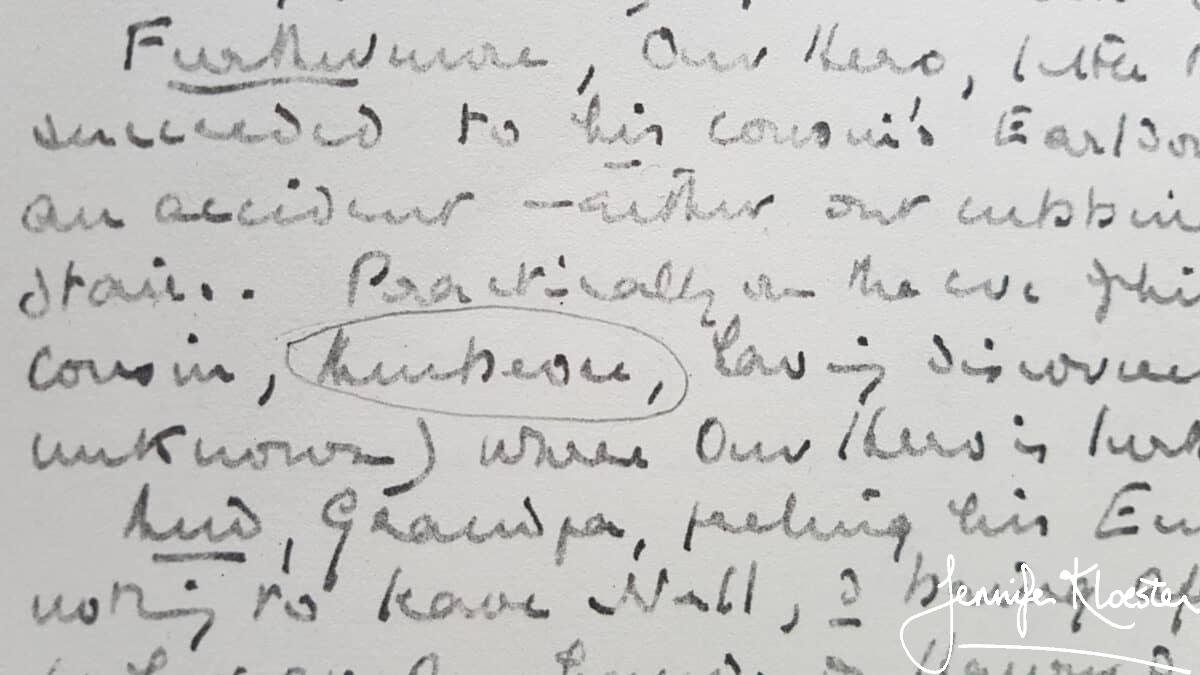
Begun in October finished in December
Georgette Heyer began writing The Toll-Gate in October 1953 with a fair idea of what the book was to be about. It would centre around her “big, handsome” hero, Captain John Staple, recently home from the Napoleonic Wars. The book opens with John unhappily present at a large family gathering to celebrate his cousin, the Sixth Earl of Saltash’s, recent betrothal to the “colourless” Lady Charlotte Calne. Surrounded by a set of mostly tedious relatives, John is bored and after a day and a night with his extended family decides to escape. He makes his apologies to his mother, and sets off alone on horseback to visit a friend in Leicestershire some sixty miles away. And with that, the set up of Georgette’s first chapter, goes no further! The rest of the novel is set in Derbyshire and the reader never again sees any of the first chapter’s characters! Of course, this was not Georgette’s original vision – she had meant to bring at least one of John’s nefarious relatives back into the story. His cousin, Lucius Staple, was to have been – beneath his veneer of smiling amiability – an out-and-out villain determined to win for himself the Earldom that, unbeknownst to John, had become his, thanks to the accidental death of the Sixth Earl, his cousin Bevis. This plot-line did not develop, however, and the author’s plan to alter the first chapter accordingly, also never came to fruition.
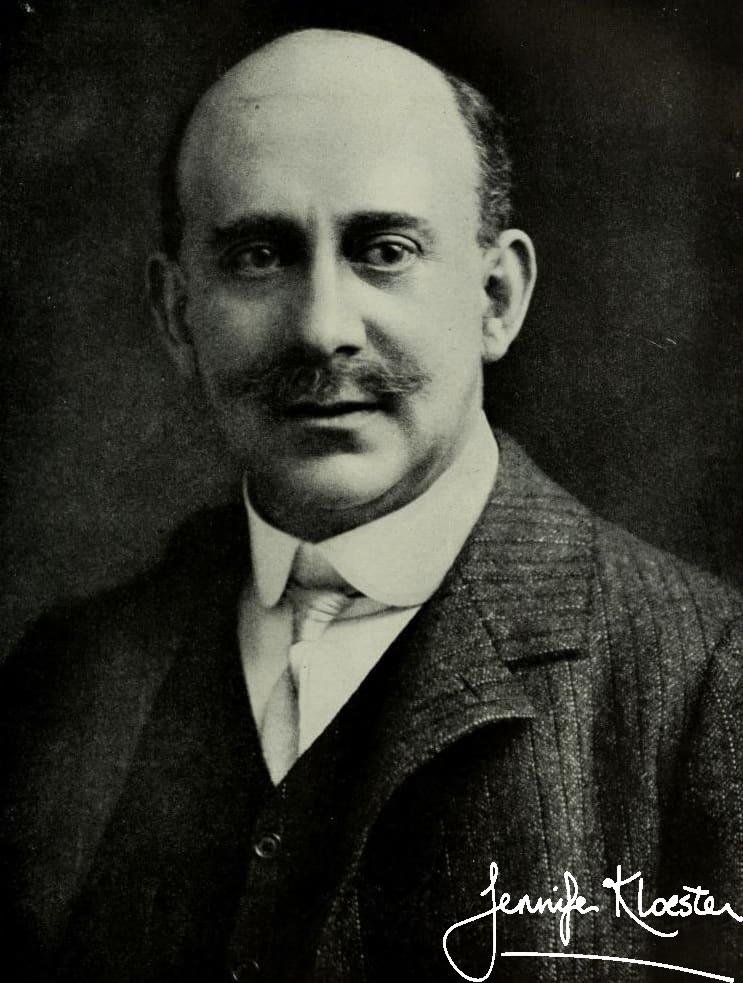
The formidable Louisa Callender
It was to Miss Louisa Callender of Heinemann that Georgette wrote her long letter outlining the details of her new book (see here) to be called The Toll-Gate. Rather like Georgette herself, Miss Callender was efficient, extremely competent and a formidable personality. Originally secretary to William Heinemann himself, by 1953 she had been with the publishing firm for several decades (Heinemann had died in 1920) and had slowly made her way up the corporate ladder until eventually, during the Second World War, she was made a director. No one knew more about the firm or the business than Miss Callender. She and Georgette Heyer first began corresponding in 1943 and, within a few years, Georgette had moved from writing to “Dear Miss Callender” to writing to “Dear Louisa” and frequently including in her letters some of the personal, everyday details of her life. It is not entirely clear if Miss Callender enjoyed Georgette’s forthright, sometimes stream-of-consciousness style of writing, but by now Georgette Heyer was one of Heinemann’s star authors and supporting her was a priority for the staff. If there is sometimes a sense in her letters that the perceptive Miss Callender did not always enjoy Miss Heyer’s very direct way of writing, this is perhaps not surprising given that they were each very strong-minded. Louisa was always cordial, however, and the letters between the two offer today’s readers a priceless insight into Georgette’s writing life, her ideas, anxieties and achievements, and for this we must be thankful.
What follows is the rest of the story of The Toll-Gate, told through Georgette Heyer’s letters to her friend and associate at Heinemann, the redoubtable Miss Louisa Callender.

“A fast worker”
Over the next few weeks, as Georgette wrote The Toll-Gate, she wrote often to Louisa Callender about the book and her hope that Miss Sutherland, the editor of Woman’s Journal, would take it as a serial prior to the book’s publication. It was common in this era for authors to have their novels serialised in magazines as a way of hooking and growing their audience. Georgette initially expected £2000 for the serial rights but this would prove to be a misunderstanding. Georgette’s relationship with that other formidable female, Miss Sutherland, (whom she always referred to as the S.B. – the “Sutherland Bitch”) was, for once, softened by the editor’s response to Georgette’s request for a shift in publication dates. I hope you enjoy the story of writing The Toll-Gate from Georgette Heyer’s own letters.
A cold in my eustachian tubes, with accompanying facial neuralgia, has slightly impeded THE TOLL-GATE’S progress, but I appear today to be somewhat amended. I think this affliction must have been sympathetic: I left Captain Staple riding over the moors in pouring rain!
Georgette Heyer to Louisa Callender, letter, 19 October 1953
Now, listen, Louisa! – I may be a fast worker, but I am not a sausage machine. I should think it extremely unlikely that I shall have anything for you to give the S.B. by next Thursday. In fact – which is what you really mean – by next Tuesday evening, when I should have to go through what I shall have written, and pack it up for posting on Wednesday. I’m not going to commit myself, and I hold out no hope. I might get a sudden rush of ink to the head, and knock off thousands of words, but I might not. Certainly not, if I were working to a time-limit like that. Quite paralysing! It is well known, amongst my entourage, that the surest way of making me put my typewriter into cold storage is to ask me How much I’ve written today, or Have I been writing today. I shouldn’t be surprised if there’s a snag looming.
Georgette Heyer to Louisa Callender, letter, 21 October 1953

Photo: Wikimedia Commons: Julie Anne Workman.
“The moon was wrong”
Sorry, I must have misunderstood you! I had it fixed in my head that you’d told me the S.B. had said she’d pay £2000 for the next period romance she accepted. Of course, if this is still a moot point I quite see that it would be nice for you to have something to bargain with. The trouble is I’m not at all sure that twenty or thirty thousand words of a book where the adventure piles up bit by bit is a very good bargaining handle. I’ll see what I can do for you, but I still can’t promise you anything. For one thing, I’m dissatisfied with the opening chapter (I think the moon was wrong when I began to write this book: I had trouble with it, and usually I don’t), and I must rewrite it. I’d rather do this when I’ve finished the whole, but if I get a bright idea I’ll see what can be done. For another thing, I loathe showing bits of my books. I have a way of opening rather quietly, which might well lead people who are given only two or three chapters to read to fear that it was going to be on the dull side. When the S.B. sees it as a whole, she’ll also see what can be cut for serial purposes, and she can’t possibly see that until she knows exactly What Happens Next
Georgette Heyer to Louisa Callender, letter, 23 October 1953
Here it is: but will you tell the S.B. that I must have it back again, because I might want to alter things – quite small points, but it does happen. Such as realizing that I’ve made something happen on the wrong day, or set one house too far from another (both of which mistakes I’ve already had to rectify!) I don’t know what you or the S.B. will think of the synopsis – and I’d better say now that it might not work out quite like that. In fact, I’ve already changed my mind about Henry’s end: Chirk shall do him in.
Georgette Heyer to Louisa Callender, letter, 16 November 1953

From Miss Sutherland
“We are all enjoying the new Heyer very much indeed and I personally am looking forward immensely to the next and final instalment! It is an unusual experience for me to find myself in the position of a ‘serial’ reader and what a maddening time they have wanting to know what happens next! The synopsis alarmed me a little from the serial point of view, for a character is brought in only once right at the opening before he appears in the final chapters in the important role of would-be murderer. Would Miss Heyer consider introducing him again at least once or twice more in the middle part of the book? Of course this may be her intention already as a synopsis is often misleading.”
Dorothy Sutherland (Editor of Woman’s Journal), cited by Louisa Callender in a letter to Georgette Heyer, 4 December 1953

Doubts and a long, long, letter!
It was not until December, when she had finished writing The Toll-Gate that Georgette began to have concerns about the publishing schedule for the book. Money had long been a major preoccupation for her because for years her advances and her royalties had been a major source of the family’s income. Throughout the 1930s, she had regularly earned two advances in a year plus royalties, but from 1944 she was mostly writing just one book a year and receiving the usual twice-yearly royalty payments. What follows is a long (long) letter explaining her doubts about the plans for serialising The Toll-Gate. I think it is worth quoting it in full because it reveals so much about Georgette’s money worries, her plans for her writing and her expectations for her book:
I have been thinking rather seriously about our conversation on the telephone yesterday, and I am afraid you are not going to approve at all of what I am now going to say to you. I only wish I could have had it all worked out before your meeting today, when I think you told me this matter was to be settled.
Baldly, I can’t agree to the autumn-publication of TOLL-GATE. I know from past experience that to miss a season is suicidal, and I am looking to the future rather than to the immediate gain of extra cash from serialization. Not that I think the loss of this is a foregone conclusion by any means. I do think (with respect!) that it would be a mistake to hand the S.B. an autumn-publication date. Why hand her any date at all? Ask her when she means to run the thing – and then say, Oh, no, that won’t do! It is nonsense for her to say that after all she didn’t get the typescript until December – if she does say this. She has known ever since October, when I started to write the thing, and told you to warn her of it, that it was coming to her before the end of the year, and I know very well she mentally accepted it then. She turned the thriller down, and she won’t turn down a romance, unless it stinks to high heaven, which we already know it doesn’t – in her nostrils. She is not proposing to bring it out in her monthly paper, but in a weekly one, which considerably reduces the time factor. I don’t really like coming out in her nasty weekly paper, but I’ve acquiesced –- and one acquiescence per book is enough! Lord, yes! I’ve even offered to make a considerable cut to oblige her. I’m in danger of pampering the woman.
I am quite sure, myself, that I should stand fast on Frere’s original suggestion to me, that the book should be published in the summer – late June, I think, was the date he threw out in conversation with me. If the S.B. should say she can’t possibly do the serialization to fit in with this date, then I am very sorry, but must decline her offer altogether. From what I know of her, I think she’ll alter her plans. If she doesn’t, it’s a great pity, but whatever she pays me for the book wouldn’t compensate for the draught I should feel later on – indeed, now! – for I’m not going to demand a £3000 advance from Heinemann now for a book which won’t appear for a year. From both our points of view this would be insane.
I am aware that on the face of it I must sound equally insane to be prepared to turn down a sum between £1500 and £2000, but let me explain to you what’s in my mind!
If I consent to the autumn-date, I shall miss a season, for my thrillers are not my main source of income, and never will be. I don’t expect to see anything much in the way of royalties on the latest: I know that the one before just, and only just, earned more than the advance paid me on it, and I see no reason why this one should do much better. When I think of my earning-books, I am thinking of my period novels, and a glance at my accounts will furnish you with the reason. It is now almost a year since COTILLION came out; TOLL-GATE really ought to be published in the early spring, so that it can run a nice time before the accounts are made up at the end of June, thus ensuring me a large sum in the autumn. This can’t be, of course, but that’s no reason for thrusting that large sum farther away still. I know some at least of the sums the Inland Revenue is going to demand from me in the New Year, and I also know that the Sur-tax and the Company’s P.A.Y.E. will have to be paid before August. Setting aside the big end-of-the-year bills, which will have to be settled. If I grab at some sum in the region of £1500, what do I use for money until I call in the TOLL-GATE advance? The royalties I received last month were very large, but the spring ones won’t come near the same figure, since it was due in great part to COTILLION’S first earnings, and to the initial sales of the three thrillers you reissued. And there will be no possible way in which I could remedy the damage caused by my own lack of foresight. I should hamstring myself. I could without much trouble, turn out another period romance for publication in the spring, but you can see that that wouldn’t do at all. If Frere threw that out in May, he could hardly throw out TOLL-GATE five months later, and I certainly don’t want TOLL-GATE postponed until the spring after next. If I could write another thriller in a hurry (which I don’t really think is on the cards, for I turn faint at the thought) it would be equally foolish to put that out hard on the heels of DETECTION UNLIMITED. So there is nothing I can do to fill the gap, and the gap has got to be filled if I am not to find myself in dire straits in 1954 and 1955. You see, I fell into this trap once before in my career, and I know that the effects, not immediately visible, are cumulative and far-reaching. It is snatching at two birds in a bush instead of holding tight to the one in your hand. Even if you were to say to me, Detective fiction is different: do another for the spring! It wouldn’t solve the difficulty. Initially these books earn exactly half what my “real” books earn; after the first royalties, nothing approaching half. I regard them as a pleasant addition to my income, that’s all. And I find them damned hard to write.
My object in having written TOLL-GATE was to get ahead of myself (so to speak) so that I could with a quiet mind return to my big mediaeval book for the best part of next year. To do that I must make sure of royalties rolling in steadily. I had visualized the possibility of my having to break off for a couple of months to write a thriller for next autumn, just to tide me over, and to keep up the correct sequence. You must realize that there will be no question of serializing the mediaeval book. It will be immensely long, and (I imagine) quite unsuitable, I don’t expect to sell it in huge quantities in this country, though there is a distinct possibility that I might do so in the States. Purdy badgers me about it in every letter he writes to me, and I know that the Yanks have just discovered the Middle ages – but I’m not banking on any American sale, not having been born yesterday, but 51 years ago.
I don’t know if I’ve made my position clear to you: I hope so! It really boils down to this: I should find life a great deal easier if I could cash in £1500 on TOLL-GATE, over and above the advance; but that £1500 is not so vital to me as a book-publication in the first half of next year, and the £3000 you will pay me on receipt of the manuscript. Now, don’t, I beg of you, suggest that you should do this anyway, because for one thing it’s idiotic, and for another it doesn’t solve the main problem! I know already that the spring royalties won’t reach anything like the figure triumphantly achieved this year; I realize that the autumn ones won’t be anything outstanding wither (unless we reject the S.B. and publish in March, giving the book time to go its right length before June 30); and I’m damned if I’m going to see to it that this lag extends into 1955! That will finally put paid to my mediaeval book – and ask Frere if he wants that!
If the S.B. likes to go straight ahead, and serialize in time for a June publication, I should be perfectly content to accept £1500 – it’s money for old rope, after all! I did no extra work to earn it. If she doesn’t – well, I’m sorry, I shall perhaps find things a bit awkward in the immediate future, but I shall know that they’ll be fine by the time I receive the royalties you pay me in the autumn.
In case you should notice that I have left out of my calculations the American side of this, let me tell you that the royalties I get from Putnam’s are negligible, and don’t enter into any prognostication I may make, and that although Joyce has screwed Purdy up to a £1000 advance on the next book, this sum – which will take her months to wring from them – won’t compensate me for the time lag.
I’m sorry, and particularly so that I couldn’t collect my thoughts enough at the time to work this all out while I was talking to you yesterday. I was startled by the suggestion of an October publication, as you know, but I was in the middle of a chapter of TOLL-GATE, and was consequently unable to marshall my thoughts properly. I worked it all out in the small hours, in bed!
I am hell to do business with, aren’t I? I quite see it!
I shall try to have a word with Frere about all of this, but I don’t think anything he could say would make me change my mind. Do you remember telling me that the S.B. confided to you that she could not afford NOT to publish me serially? I suspect that if you make it plain to her that although I don’t in the least blame her for being unable to fall in with my plans I can’t fall in with hers and so must regretfully ask for the return of half a typescript, and she will do some hard thinking.
In any event my mind is made up, which simplifies things – or so I have always found. Of two evils, choose the lesser, is my motto!
But I do apologize for not having leapt to all this as soon as you told me what your ideas were.
Georgette Heyer to Louisa Callender, letter, 9 December 1053
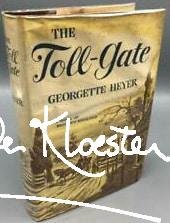
Miss Sutherland agrees
Miss Sutherland has agreed to July publication for the book. As I told you over the telephone, she offers £1500 for this book and definitely, £2000 for the next Regency book. I take it, therefore, that all is now well if we set our book publication for July.
Louisa Callender to Georgette Heyer, letter, 11 December 1953
Georgette is grateful
Many thanks for the typescript, and for your letter. That’s much better. A Regency romance published in July leaves the way open, at need, for a thriller in late autumn or the New Year. If I find myself obliged to embark on one, I’ll try to make it thrilling enough to serialize. Will you please tell the S.B. that I am most grateful to her for meeting me halfway, and have done what I can, by way of a quid pro quo, top meet her wishes with regard to the story itself? I have eliminated the succession, and the wicked cousin, and have reduced the book to more reasonable proportions. I think it is just under 100,000, and no doubt she will be able to cut quite a bit more, here and there. I don’t mind. Further tell her that while I think this must be, with all my cuts and crossings-out, the most revolting typescript she has ever received, I imagine she would rather have it now, as it stands, than later, beautifully retyped. It is quite clear, however uninviting.
Thank you for fighting this battle so successfully! Do you ever wish you had taken up cooking, or charring, or, in fact, anything other than dealing with Authors?
Georgette Heyer to Louisa Callender, letter, 12 December 1953.
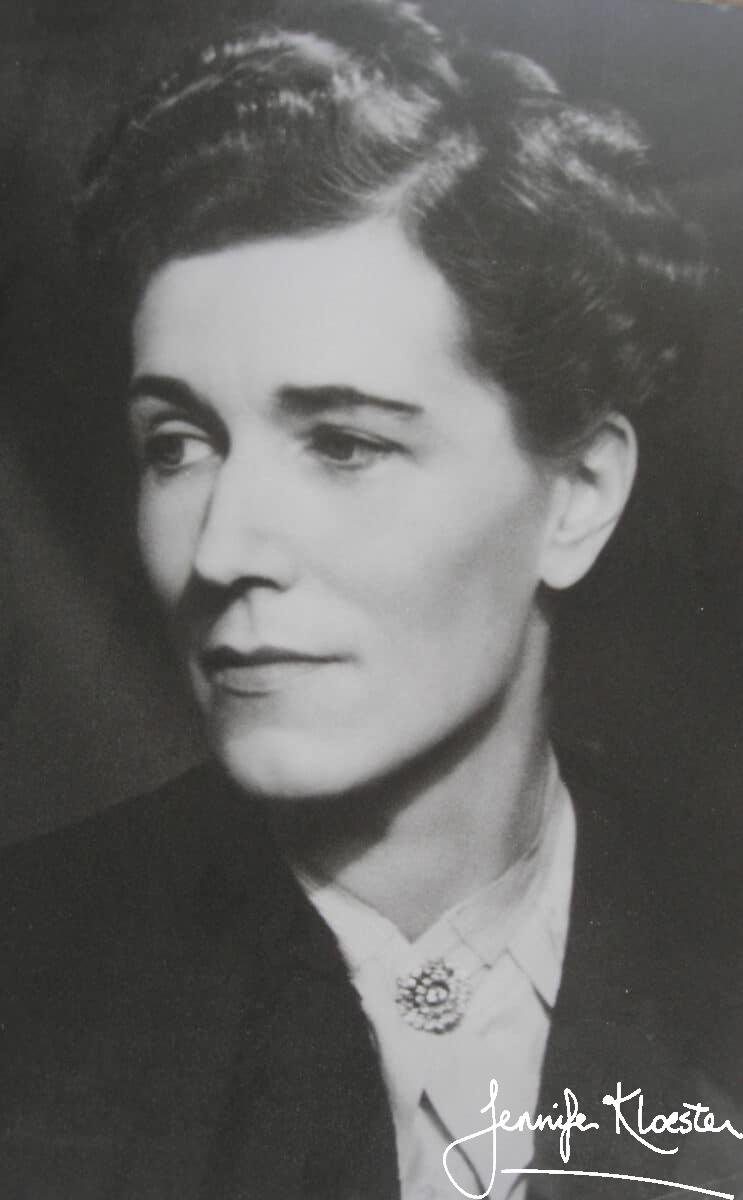
And now for the blurb…
Here is what our publicity people propose for the spring list. Do you approve?
Louisa Callender to Georgette Heyer, letter, 15 October 1953
I can’t say I’m mad cats about it, but I suppose it’ll do – now I’ve tinkered with it a little. “Handsome, tall Captain John Staple” made me feel unwell, besides being a false picture. I’ve altered it to “Big, handsome…” which also makes me feel unwell, but which at least conveys more of an impression of a man who probably weighed about fifteen stone, stripped! I’ve also knocked out “for the first time for many years.” Whoever wrote this got a bit muddled. No new coinage had been minted for some years, but we can’t talk of sovereigns and half-sovereigns being minted for the first time for many years, because they had never before been minted at all – as any number of Know-alls would be only too ready to point out to us.
Georgette Heyer to Louisa Callender, letter, 19 October 1953
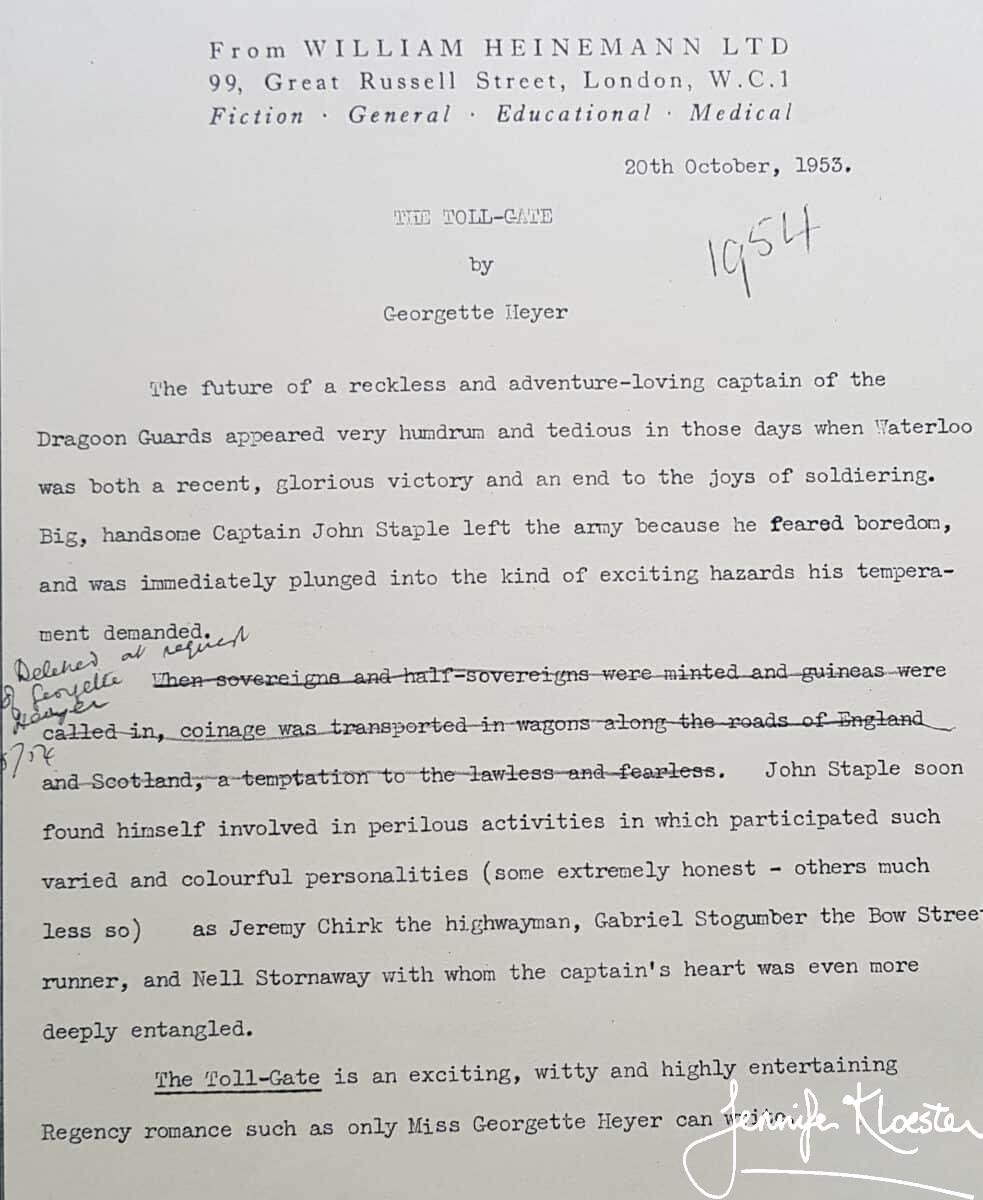
“Comic genius”
Once again Georgette Heyer has directed her comic genius along the fictional highway of 19th century England, but this time with a new twist. In The Toll-Gate, a fun, speckled piece with a more prosaic title than the action warrants, Mrs. [sic] Heyer abandons the courtly glitter of aristocratic London salons. Instead, she cleaves with refreshing persistence to the commoner levels of live flowing along one of the rural turnpikes of Regency England’
Henry Cavendish, “19th Century Upper-Crust Fun” Chicago Sunday Tribune, 19 September 1954.






3 thoughts on “The Toll-Gate – A ripping yarn! Part 2”
Thank you so much Jennifer for this wonderfully comprehensive coverage of the birth of The Toll Gate and the delightful insights into GH’s life, humour and thoughts… it was so personal and it felt as if we were walking the journey with her! Thank you again 💐
Thank you so much for taking the time to post, Pam. I’m so glad you enjoyed the wander through the Toll-Gate! I really enjoy sharing my research material with all those who love and appreciate Heyer and am glad to know it’s worthwhile. I really appreciate your comment.
I have just finished reading The Toll-Gate for the first time and I absolutely loved it. The descriptions of the toll-gate, the cabin, the forest and paths and the cave, the almost incomprehensible slang, and (to my mind anyway) well-developed characters. Thank you for writing these posts and introducing us to the back-story. As I was reading, I felt like the writer herself must have been as riveted by the story as I was, and getting to read her ideas as she is explaining the developing plot confirmed that suspicion! I’m now hoping to track down an old copy of the book for the next time I need an adventurous read–this time I read it on my Kindle which you know is just not the same.